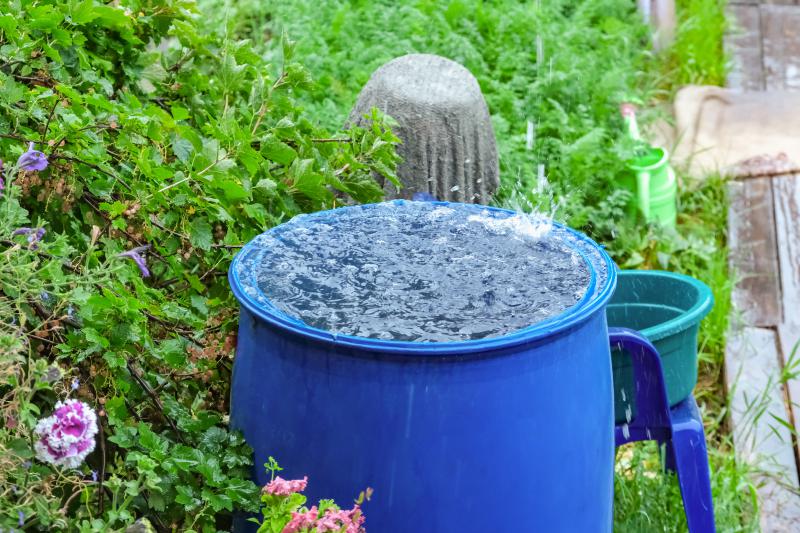Spring will be here before we know it, bringing warmer weather to Fairfax County. As you dig into gardening and other outdoor activities around your home again, you may be getting ready to take the hose out of hibernation. But did you know there’s another source of water that could benefit your wallet, your home landscape, and the environment?
That’s right—it’s rain! Rain barrels provide a straightforward way to collect, store, and use rainwater at home. Read on to learn more about rain barrels in Fairfax County, just in time for those April showers.

What Are Rain Barrels, and How Do They Work?
It’s all in the name: a rain barrel is a particular type of barrel that collects and stores rain. It can be placed under your gutters’ downspouts to capture runoff from your home’s roof. The Northern Virginia Rain Barrel Workshop’s do-it-yourself rain barrels, for example, are made from repurposed black plastic barrels that once held products like onions, pickles, or peppers. These barrels can hold more than 50 gallons of water! A rain barrel should also include a faucet for using the collected water and a screen to prevent mosquitoes from getting inside.
Once the water is captured, you can use it for a variety of (mostly outdoor) purposes, like washing your car or watering your lawn and garden. (Just note that there are some differing opinions on whether you should use rain barrels to water vegetable gardens, which you can read about in the FAQ section of Northern Virginia Soil and Water Conservation District's Rain Barrel Workshops webpage.) You can also use rainwater to nourish your indoor plants. However, never use rain barrel water for drinking, cleaning, or cooking—rainwater can carry dirt and pollutants. It hasn’t been treated and isn’t safe to consume.
Why Harvest Rainwater?
There are a handful (or should we say barrelful?) of benefits to storing and using rainwater.
Save Money
Using rainwater to wash your car or water your landscape means you’re saving the water from your treated water system that you otherwise would have used. By saving that water, you save energy: it takes a considerable amount of energy to process and treat water. So, when you use collected rainwater, you save money on your utility bills.
The savings potential is especially significant in warmer seasons when plants need lots of water. In fact, the U.S. Environmental Protection Agency (EPA) WaterSense site estimates that between 30 and 70 percent of homeowners’ summertime water use is for outdoor purposes, depending on the region.
Reduce Emissions and Runoff
Using rainwater has environmental benefits, too. By using your collected rainwater, you help reduce your household’s environmental impact, since energy production and use contribute to greenhouse gas emissions. But that’s not all—rain barrels also help reduce runoff, which is the water that drains off surfaces when it rains. As it runs off these surfaces, it picks up the pollutants on them, like fertilizer, oil, bacteria, dirt, and pesticides. It can carry these pollutants to our clean water sources (think: rivers and lakes). According to the U.S. EPA’s Soak Up the Rain, reducing runoff can “help prevent water pollution, reduce flooding, and help protect our precious drinking water resources.” That’s a pretty significant impact!
Green Your Garden
Rainwater is good for your garden. On hot and dry days, it provides an easy source of water to help keep your plants thriving. It’s also considered naturally “soft,” and it doesn’t have the added chemicals, like chlorine, that treated water has. Plus, it contains nutrients that help plants grow and stay healthy. Your landscape will thank you later!
How Do I Get Started?
Properly installing and maintaining your rain barrel is important to make sure it functions safely and effectively. To make it easier for residents to get started, Fairfax County and the Northern Virginia Soil and Water Conservation District—a locally led conservation agency—are part of a regional initiative that offers build-your-own rain barrel workshops and distributes low-cost rain barrels to Fairfax County residents. Many retailers also sell rain barrels and rain barrel supplies.
You can also review the Northern Virginia Soil and Water Conservation District’s handy PDF guide to installing and using a rain barrel.
Learn More
Visit the Soil and Water Conservation District homepage for more information on water conservation and resources in Fairfax County. Plus, sign up to be notified of upcoming rain barrel workshop dates and check out the artistic ways that local residents have decorated their rain barrels.

